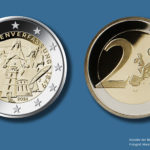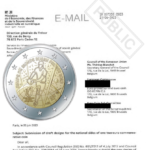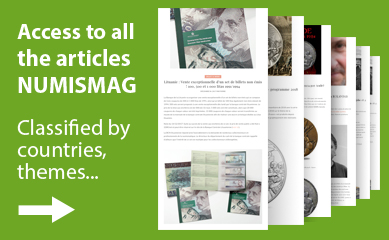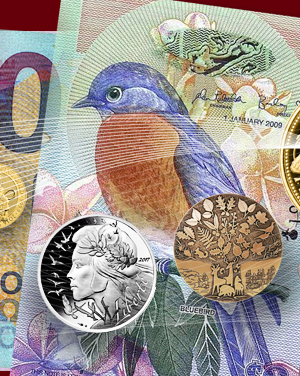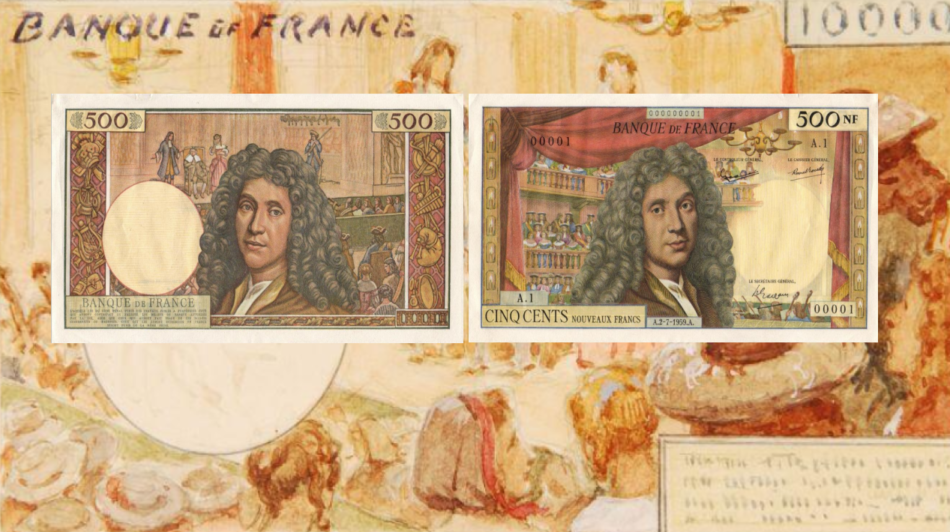
History of the 500 francs MOLIERE type 1959 of Jean LEFEUVRE
- April 10, 2023
- by
- Pierre

Last update 04/11/2023 – February 17, 2023 marked the 350th anniversary of the death of Molière. The Banque de France had entrusted the project of a Molière banknote to the artist Jean LEFEUVRE. This banknote was to have a high face value and was to be issued as of the changeover to the new franc. This last one took place on January 1, 1960. Thus, this banknote revives in the new French currency (new franc) the tradition of the first banknotes issued by the Banque de France, i.e. high denomination banknotes intended for professional use (trade and financial institutions transactions). This is probably one of the reasons why the collection value of this bill approaches the initial face value of this bill, expressed in constant value, as we will demonstrate in this article.
The Genesis of the Moliere banknote Project
This banknote is part of the series designed and printed by the Banque de France entitled “Famous creators and scientists”.
At the request of the Banque de France, the artist Jean Lefeuvre, Grand Prix de Rome 1908, submitted several proposals for models celebrating Molière. One of these vignettes unveiled by the Banque de France was a project that had not been validated by the Bank’s authorities. It celebrates the play “Le Malade imaginaire”. Molière plays the character of Argan, represented on the chair. The two drawings were inspired by an engraving by Jean Lepautre of the first performance of the play at Versailles in 1674, one year after the author’s death.
The two vignettes offer two opposite perspectives. On the reverse side, the vignette presents us with the vision of the piece under the eyes of a spectator.

Back of the unissued project of Jean Lefeuvre – 500 francs Molière 1959
On the front, another point of view illustrates the draft ticket, from the backstage. The actors are seen from behind and the King from the front.
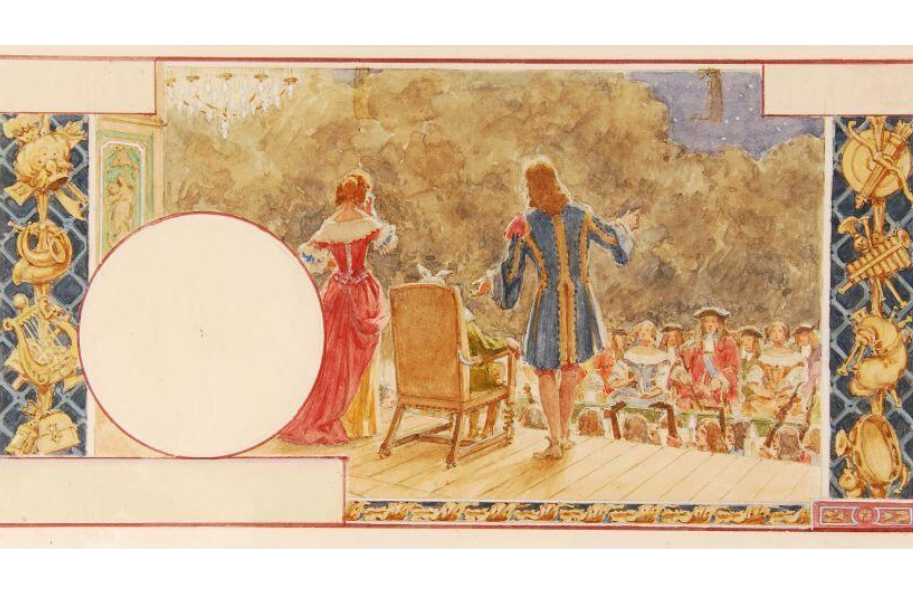
Front of the project not retained by Jean Lefeuvre – 500 francs Molière 1959
The portrait of a woman appears in the background. It is that of Armande Béjart, the wife of Molière.
However, this composition is too far from those of the other banknotes of this range, which probably explains why it will not be retained. The choice of the Bank of France is explained by a concern for consistency of the new range of bills, as a whole.
The Molière banknote project was initially envisaged as a replacement banknote for the Banque de France, with the highest face value of the last series of old franc banknotes, i.e. 10,000 francs (counter value: 100 new francs).
The banknote bearing the effigy of Molière, which will finally be issued from December 1960 and will be the only banknote denominated only in “New Francs”, will propose a classic layout more in line with the other banknotes.
Who is Jean LEFEUVRE?
Jean Lefeuvre is a French painter, born on August 6, 1882 in Saint-Germain-le-Guillaume and died on December 31, 1974 in Ernée. He was a student at the Ecole des Beaux-Arts in Paris. He then obtained the Grand Prix de Rome in 1908. In accordance with the tradition of the time, he was then a resident at the French Academy in Rome, Villa Medici from 1909 to 1912. The villa is currently occupied by the French Embassy in Italy.
He was awarded a gold medal at the Salon des artistes français in 1914 and a silver medal at the 1937 International Exhibition.
He received from the Bank of France orders for models in the effigy of Henri IV, Molière, Voltaire and Pierre Corneille, the components of the series “Famous creators and scientists”, issued for the needs of the transition to the new franc from 01/01/1960.
The artist also realized other projects of banknotes which were “not emitted” such as the Clémenceau, the Molière (10000 francs), the Montaigne, the Victor Hugo (young), the Racines, or the Maréchal Ferdinand Foch.
Final banknote design of the 1959 type
The Banque de France had initially planned a banknote bearing the effigy of Clémenceau but, as its engraving had not given satisfactory results, it finally decided to replace it with the “Molière”, the project for which was already under study.
The unissued versions of the Moliere banknote
The banknote was produced in a first version with a face value of 50,000 francs.
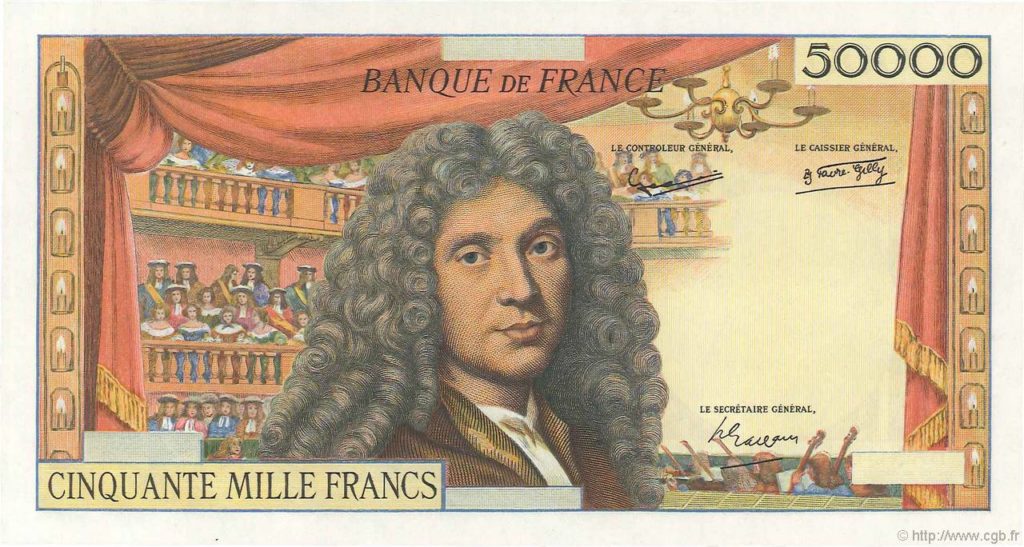
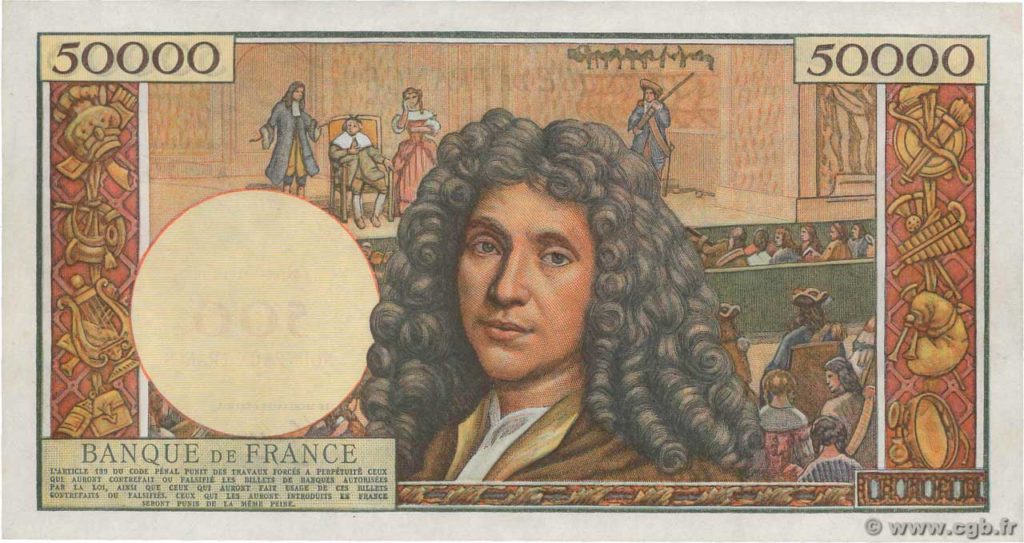
Draft 50 000 francs Molière 1959 – unissued bill
sold by CGB €22 400 in 2017
A second draft of a 50,000 franc banknote, overprinted in red with the counter value of 500 new francs, was then produced.
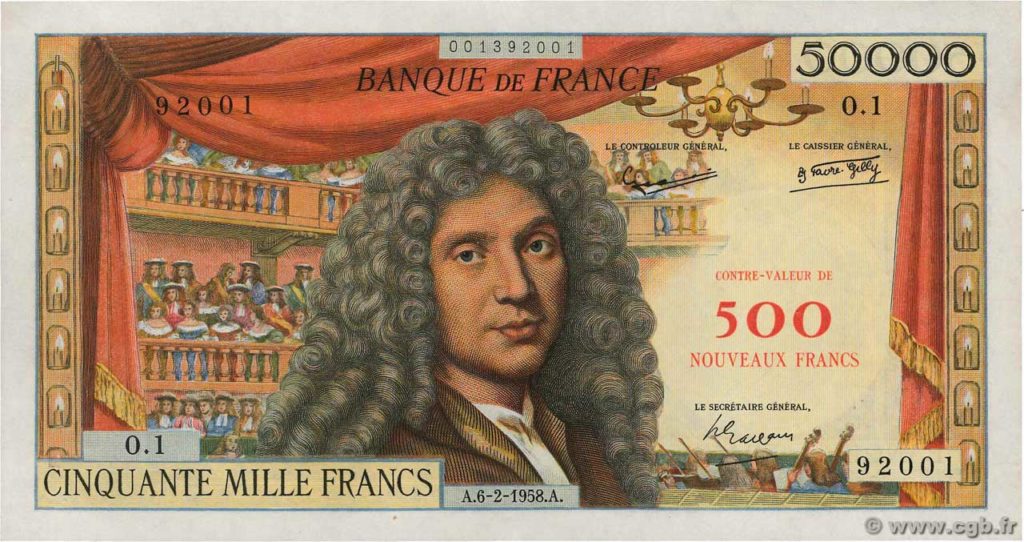
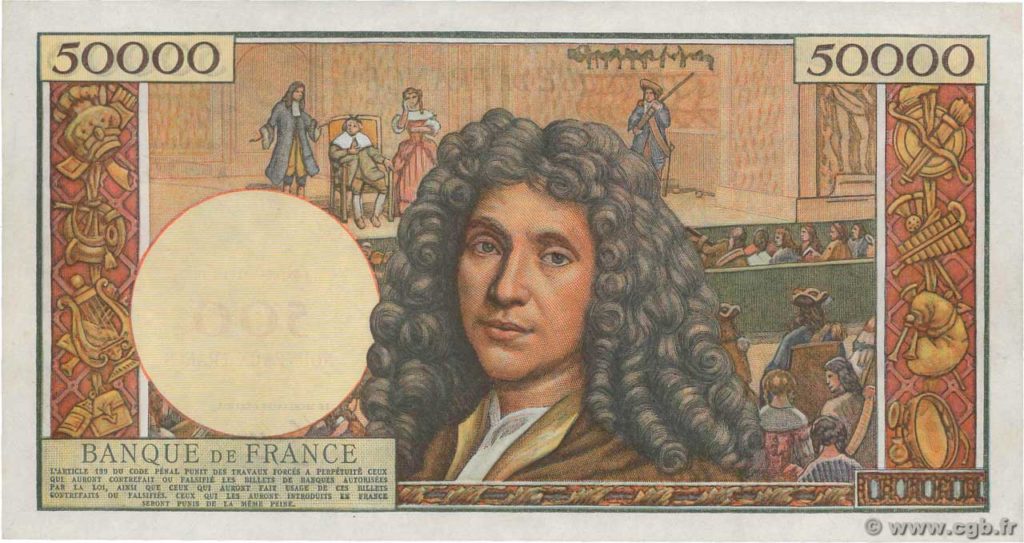
Draft 50 000 francs Molière 1959 overprinted – unissued bill, sold by CGB
Sold on 11/02/2015 for €25,000
Sold on 03/07/2018 for €23 000
The size of the cartridges was originally designed for this “large” face value, which proves that the Molière banknote project dates from before the franc reform (1960).
The banknote with the effigy of Molière will be the only banknote of the series denominated only in “New francs”.
The red overprint “500 new francs” was printed by the establishments DRAEGER, the Bank of France not having the adequate material at its disposal in the print shop of Chamalières. This service of the private printer will be invoiced 14 million francs to the Banque de France.
83 656 banknotes overprinted in red were destroyed by the Banque de France between January 21, 1960 and March 09, 1960.
Specimens of the Molière banknote
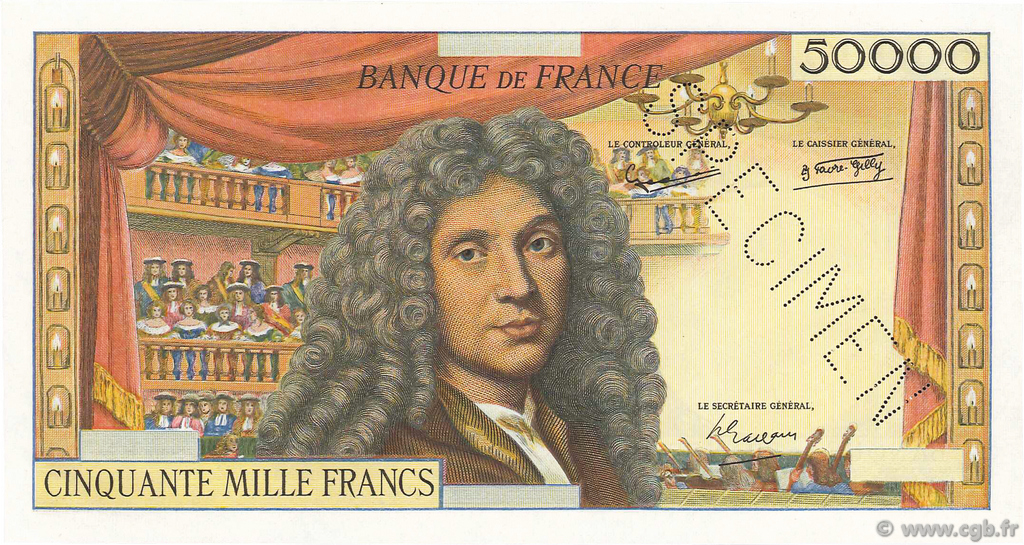
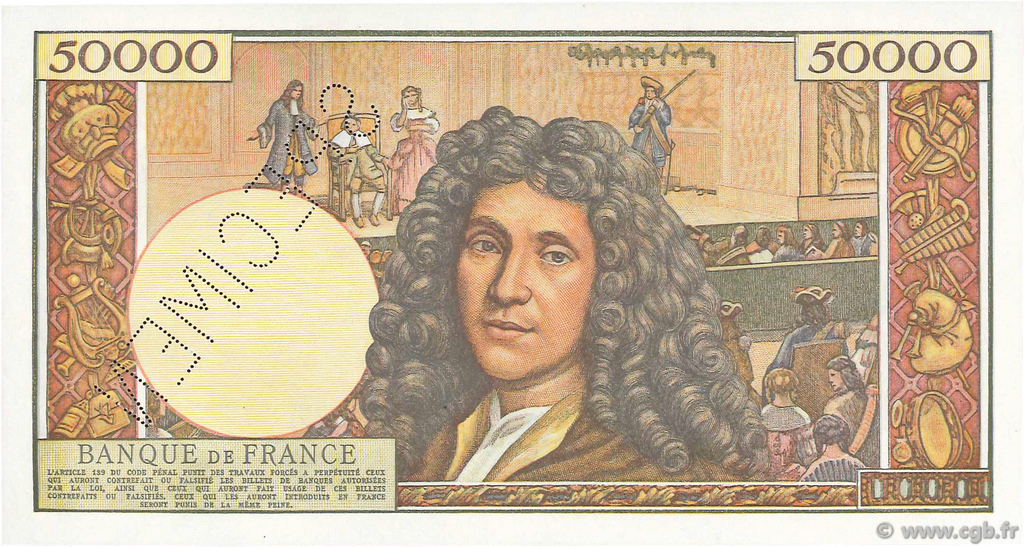
Specimen of the first unissued version – 50,000 Molière francs
Sold for €25,000 in 2013
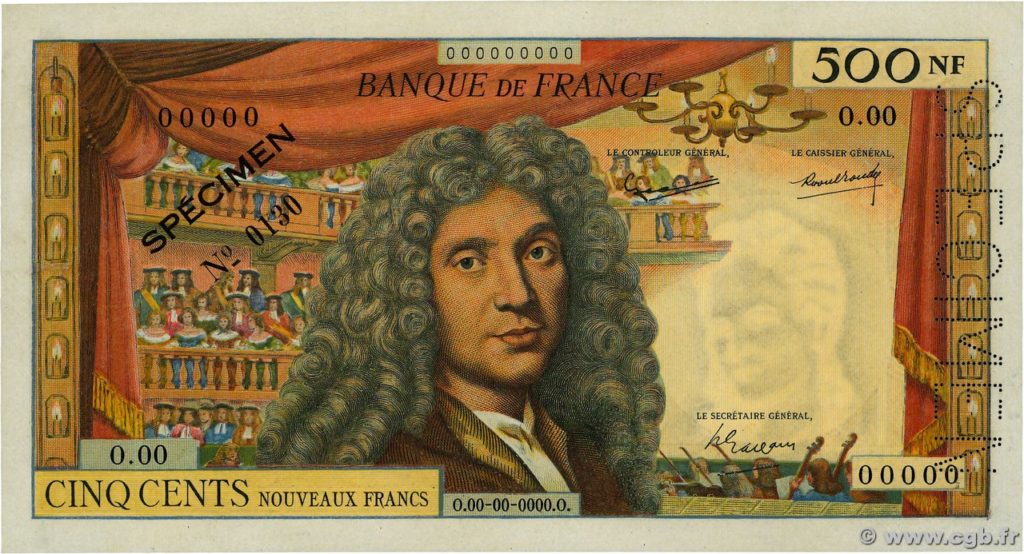
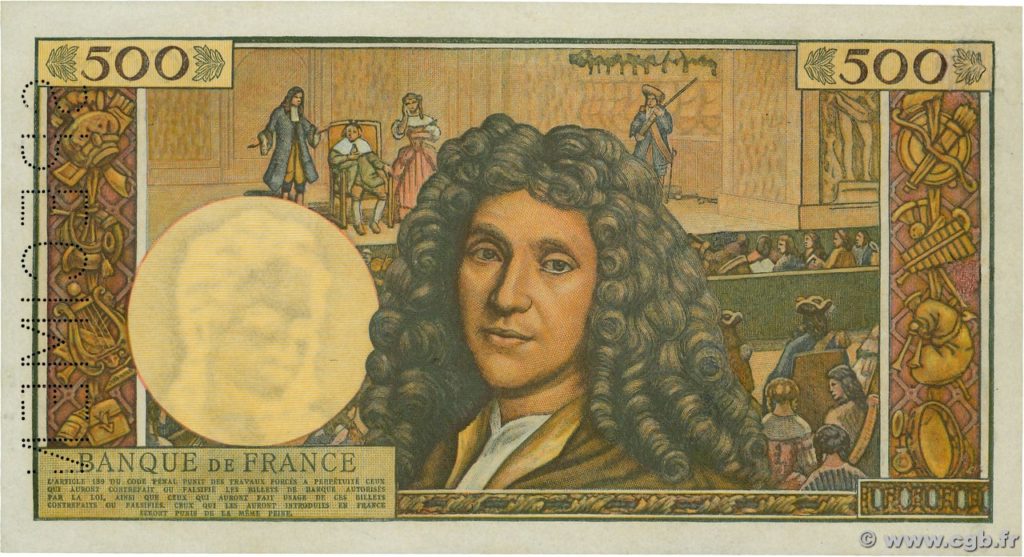
Specimen of the first version issued with n° 0130 in black overprint – 500 francs Molière
Sold €3 820 by CGB on 04/01/2022

Uniface proof of the Molière banknote without face – without black ink passage
Sold €856 in 2009
Official dates of the 500 francs Molière, type 1959
First authorization of creation: July 2nd, 1959
Put into circulation: December 2nd, 1960
Beginning of the withdrawal of the bill: March 9th, 1970
Deprivation of legal tender: April 30th, 1971
NB: This banknote was prematurely withdrawn from circulation due to counterfeiting and replaced by the 500 Pascal francs in January 1965. It is thus the bill in new francs having had the shortest life. It was replaced by the one having had the longest life of circulation.
Front of 500 francs Molière
It consists of the portrait of the French actor and playwright Molière (1622 – 1673) engraved according to a work of Nicolas Mignard, exposed in the Condé Museum of CHANTILLY(60). The background of the composition recalls an evening in the hall of the Palais-Royal where Molière died during the third performance of Le Malade Imaginaire. In the foreground are the pit and the musicians and on the left the spectators in the galleries of the hall.
The typography is in four colors (yellow, red, light blue and dark blue) for the vignette and in black for the signatures and clues. A black intaglio engraving enhances the major features of the vignette.
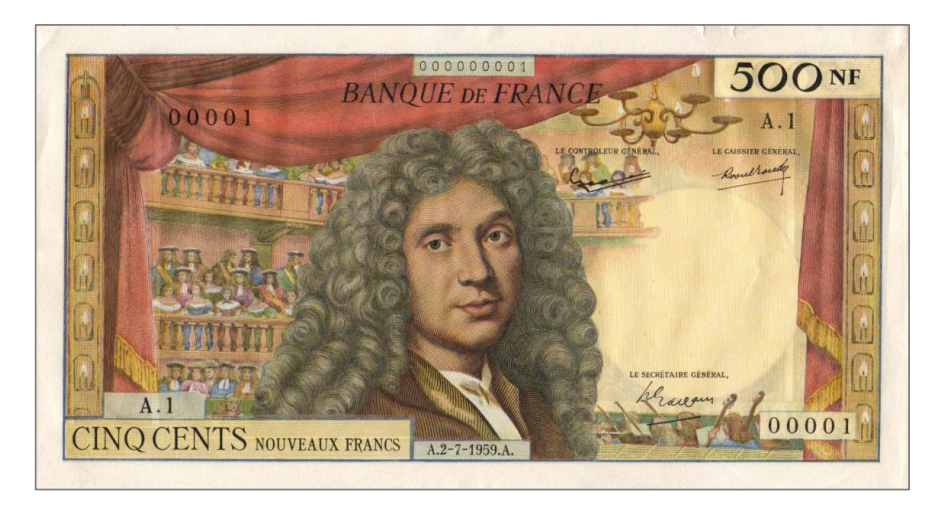
Back of the 500 francs Molière
It represents an identical portrait of Molière, reversed from the one on the front but treated in a different way. The vignette is inspired by an engraving by Jean Lepautre depicting a performance of Le Malade Imaginaire in the park of the Château de Versailles, after Molière’s death in 1674. Side panels recall the attributes of comedy and music.
Typography is in four colors (yellow, red, light blue and dark blue), as for the front of the banknote.
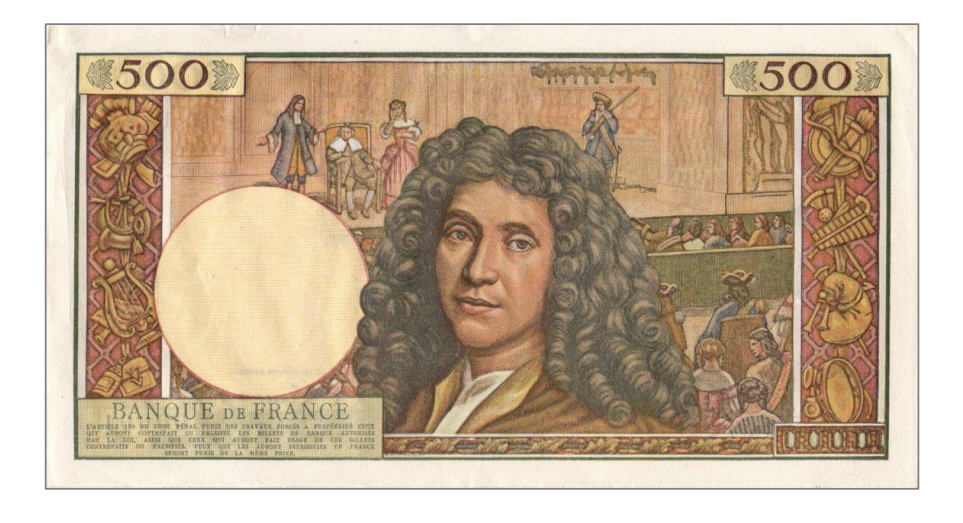
The watermark of the banknote depicts a portrait of Armande Béjart, French actress and wife of Molière, posing in a three-quarter view. Like the other denominations in this series, the 500 franc Molière has a watermark that is lightly covered with a yellow veil to make it very difficult to capture on film.
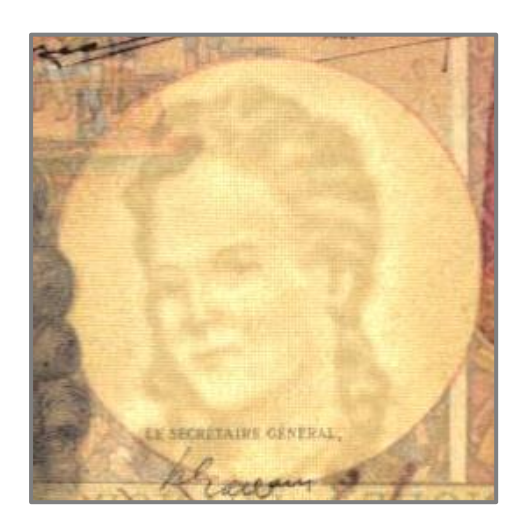
Armande Béjart Watermark
Two combinations of signatories are known:
Pol Gargam – Gaston Goüin D’Ambrières – Raoul Tondu (series 1 to 21)
Pol Gargam – Hubert Morant – Raoul Tondu (series 22 to 25)
The “population” of 500 francs Molière
The amount of the authorized issue was 31.25 billion francs in cumulative face value. This amount represents 62.5 million bills (25 alphabets of 2.5 million bills). Each alphabet is composed of 25 series of 100,000 bills, each identified by a letter from A to Z (except for the letter “I”).
Several “small numbers” tickets have been sold by CGB.fr:
A1 00078: sold 3 100€ on 12/01/2016
A1 00268: Fayette sale in progress – bid of 2 600€.
A1 00284: sold 1 700€ on 10/10/2017
Two banknotes from the last series and last letter (Z25) were sold:
Z25 – n°19124 – TTB – sold 495€ in 2010
Z25 – n°73801 – SUP – sold 950€ in 2011

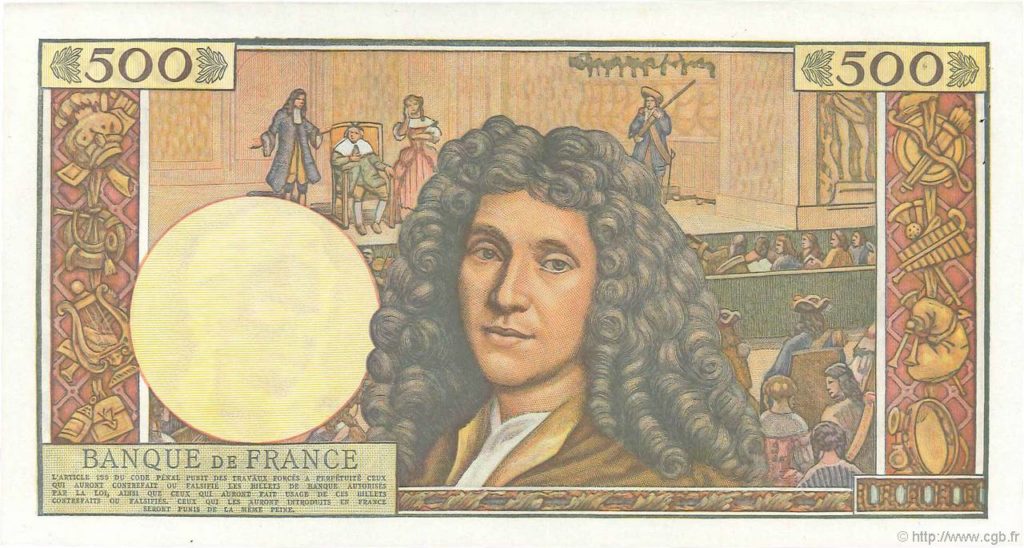
Banknote of 500 francs Molière type 1959 – small number A1 00078
Sold by CGB 3 100€ on 12/01/2016
Collection value of the 500 francs Molière (circulation banknote)
We have already given you the transaction values for the unissued versions of the bill as well as for the specimens in this article (see below). We draw your attention to the fact that the number of these bills is extremely limited and that the price indications given are those of some public transactions. It is important to be aware of this if you wish to acquire this type of bill.
The following quotations are therefore only valid for the 500 francs Molière banknotes, depending on their condition:
VF: 300€ – 350€
XF: 450€ – 550€
AU: 700€ – 900€
UNC: 1800 – 2200€
In 1959, the average annual salary of a worker was 5,526 francs (“les salaires de 1950 à 1975” by C. Baudelot and Anne Lebeaupin – Revue économique et statistique de 1979 – p113). The face value of the Molière therefore represents nearly 10% of a worker’s annual salary. This value is therefore high.
If we transpose this reflection to our day, the average annual salary of a worker in 2022 is 23 040€ (economic panorama INSEE 2022). A new collector’s bill therefore represents a little less than 10% of the annual salary of a worker in 2022. The intrinsic value of this banknote, as a collector’s item in perfect condition, remains stable 63 years after its issue.
This stability in the value of this bill, from means of payment to collector’s item, is due to the fact that its high face value protects it from devaluation. Indeed, the use of this banknote as a reserve of value for professionals or private individuals with important assets has led to a high return of these banknotes to the Banque de France counters when it was withdrawn from circulation and demonetized. Its rarity was thus preserved guaranteeing its value for the future as a collector’s item.
Sources: CBG.fr (photos) – Banque de France and NUMISMAG




